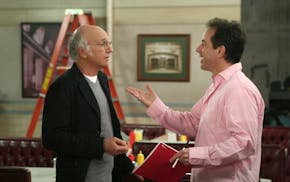Before she was zapping zombies and harnessing a pair of armless, jawless slaves on "The Walking Dead," Danai Gurira was slaying audiences as a playwright and actress in the Twin Cities.
Gurira, who was born in Grinnell, Iowa, and raised in Zimbabwe, graduated from Macalester College in 2001, but not before making a name for herself with a collection of monologues and an appearance in a critically acclaimed production of "Colored Girls." She earned raves for a moving performance in 2007's "The Visitor," a film that earned co-star Richard Jenkins an Academy Award nomination.
But Gurira is best known these days as the tough-as-nails zombie killer Michonne, a beloved character in the "Walking Dead" comic books that has finally entered the TV series in its third season. Gurira's first show drew 14 million viewers, making it the most watched episode of a drama in cable history.
Now that's scary.
Gurira, 34, took a break from beheading creatures last week to talk about her moment in the spotlight, her memories of Macalester and the soothing nature of Teddy Pendergrass.
Q So, what's it like to play TV's most badass character?
A I don't think that's really the case. I guess she's a badass woman, but she's also very complex. She's not just one thing. Her heart is very pure. She's not needy. That's a rare thing for women characters. The fact that she's as capable as men is right up my alley in my search to play strong black women on screen.
Q Does Michonne's sword help you get into character or is it just a prop? A The training really did help me. My body has to come alive for me to slip into a character. Even if it's Shakespeare, the language has to come from the physical side. No one speaks just from their head. I got to a point where I was very comfortable and the sword wasn't just this heavy thing that hurt me.
Q Are you able to separate yourself from the character or do you drive home still in kill mode?
A It's funny. When the wardrobe guys are prepping me, they have to come at me gingerly. When I feel like I don't want them to touch me, I know she's around. But when I step out of her, I can be the goofiest person on set. They call me "The Voice," because I really can't sing. Usually it's '80s adult soul contemporary, like Teddy Pendergrass.
Q What's it like to be surrounded by zombies?
A I was initially pretty weirded out. When you see them at lunch it's sometimes not that appetizing.
Q What about your slaves? What kind of relationship do you have with those actors? A We're cool. The first day I met them, they were in character and someone handed me their chains. We've actually become buddies. We had to. I'm yanking on them and they have to be cool with that. The actors have to wear these colored contacts, so they can't see that well and they have to rely on me to get around.
Q You had a chance to work with Richard Jenkins. What's he like?
A I love Richard. He came to see me this past summer doing Shakespeare in the Park and I told him that he was like my kind uncle. He is so generous as an actor, so deeply attentive and willing to burrow deep into the humanness of every moment. He's never condescending and is always nurturing.
Q How did you end up at Macalester?
A My father loved the small liberal-arts experience and he wanted it for all his kids. My sister was already at Macalester and I lived in her apartment after graduating in Zimbabwe. [Her African-born parents moved back to their native country after her father taught chemistry at Grinnell College.] I got to know the area and started making some friends. I loved being in a city so connected to the arts.
Q When did you decide to become a professional actor?
A I was in theater [in college], but I started majoring in psychology. I spent a semester in South Africa and was really influenced by the artists there. I had a fear of instability before that, but I realized that if they were doing it there, I could do it, too. The most important thing I learned at Macalester was the power of my voice and to keep injecting it wherever you go.
Q I enjoyed chatting with you, but I'm worried I'll no longer be properly intimidated by your character.
A She's a lot different than me. I can barely see myself in her. Hopefully when you watch, you can forget all about me.
njustin@startribune.com • 612-673-7431 • Twitter: @nealjustin

CBS will turn the lights back on for Billy Joel concert

TV to watch: Billy Joel offers concert for those of us who aren't big shots

Justin: 10 TV shows about the Founding Fathers that are more fun than Apple's 'Franklin'

TV review: Robert Downey Jr. spoils 'The Sympathizer'


